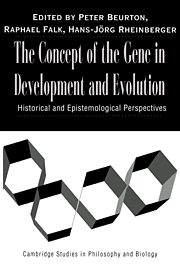Book contents
- Frontmatter
- Contents
- Introduction
- List of Authors
- PART ONE GENES AND TRAITS
- PART TWO EXTRACTING THE UNITS OF HEREDITY
- PART THREE GENETIC PROGRAMS AND DEVELOPMENTAL GENES
- PART FOUR CONCEPTUAL PERSPECTIVES
- 10 Gene Concepts: Fragments from the Perspective of Molecular Biology
- 11 Reproduction and the Reduction of Genetics
- 12 A Unified View of the Gene, or How to Overcome Reductionism
- FINAL REVIEW
- Glossary
- Index
12 - A Unified View of the Gene, or How to Overcome Reductionism
from PART FOUR - CONCEPTUAL PERSPECTIVES
Published online by Cambridge University Press: 12 January 2010
- Frontmatter
- Contents
- Introduction
- List of Authors
- PART ONE GENES AND TRAITS
- PART TWO EXTRACTING THE UNITS OF HEREDITY
- PART THREE GENETIC PROGRAMS AND DEVELOPMENTAL GENES
- PART FOUR CONCEPTUAL PERSPECTIVES
- 10 Gene Concepts: Fragments from the Perspective of Molecular Biology
- 11 Reproduction and the Reduction of Genetics
- 12 A Unified View of the Gene, or How to Overcome Reductionism
- FINAL REVIEW
- Glossary
- Index
Summary
ABSTRACT
The conceptual history of the gene, beginning as an inference from the observation of Mendelian regularities in inheritance at the turn of the last century and reaching an apex with the unraveling of its biochemical structure by Watson and Crick in 1953, figured for a long time as a standard example of successful reduction in the life sciences. This has variously led to highly reductionistic interpretations of Darwinian evolution. But ever since its internal makeup was known, the gene has also become an increasingly problematic entity. Indeed, a conceptual crisis has arisen during the last twenty years as a result of the discovery of overlapping genes, alternative splicing, and so on. What once looked like a particulate gene now turns out to be scattered across parts of the genome with no hard-and-fast boundaries. Genes seem to depend on the genome's regulatory activities which, in turn, may depend on how the molecular biologist wishes to manipulate the genome in experiment. This has led to the widespread opinion that the gene is devoid of any special reality, or, is just a word. I contest this view and continue to argue for a unified gene concept. I do so by defining the gene as the genetic underpinning of the smallest possible difference in adaptation that may be detected by natural selection. Differences in adaptation among individuals, by directing natural selection toward the genetic underpinning of such differences, may be instrumental in the formation of genes.
- Type
- Chapter
- Information
- The Concept of the Gene in Development and EvolutionHistorical and Epistemological Perspectives, pp. 286 - 314Publisher: Cambridge University PressPrint publication year: 2000
- 8
- Cited by



